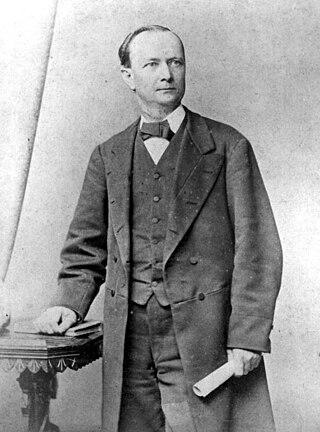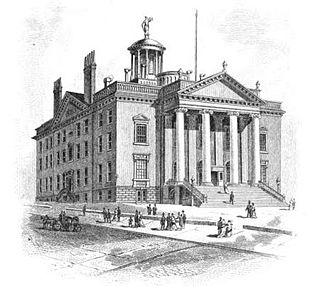Related Research Articles

The Brooks–Baxter War, also known as the Brooks–Baxter Affair, was an attempt made by failed gubernatorial candidate Joseph Brooks of the “Brindle-tail” faction of Arkansas' Republican Party to take control of the state from Elisha Baxter, who was the Republican governor. The victor in the end was the Baxter administration, also known as the "Minstrels", supported by some "carpetbaggers" and Democrats over the Brindle-tails supported by "scalawags" and "freedmen".

The Wisconsin Senate is the upper house of the Wisconsin State Legislature. Together with the Wisconsin State Assembly they constitute the legislative branch of the state of Wisconsin. The powers of the Wisconsin Senate are modeled after those of the U.S. Senate.

William Dunnington Bloxham was the 13th and 17th Governor of Florida in two non-consecutive terms. Prior to his first term as governor, he served in the Florida House of Representatives.

Harrison Jackson Reed was an American editor and politician who had most of his political career in Florida. He was elected in 1868 as the ninth Governor of Florida, serving until 1873 during the Reconstruction era. Born in Littleton, Massachusetts, he moved as a youth with his family to Milwaukee, Wisconsin, where he had a grocery store and started farming. He also owned and edited the Milwaukee Sentinel for several years.

The Electoral Commission, sometimes referred to as the Hayes-Tilden or Tilden-Hayes Electoral Commission, was a temporary body created by the United States Congress on January 29, 1877, to resolve the disputed United States presidential election of 1876. Democrat Samuel J. Tilden and Republican Rutherford B. Hayes were the main contenders in the election. Tilden won 184 undisputed electoral votes, one vote shy of the 185 needed to win, to Hayes' 165, with 20 electoral votes from four states unresolved. Both Tilden and Hayes electors submitted votes from these states, and each claimed victory.

The Constitution of the State of Florida is the document that establishes and describes the powers, duties, structure, and function of the government of the U.S. state of Florida, and establishes the basic law of the state. The current Constitution of Florida was ratified on November 5, 1968.

The government of Florida is established and operated according to the Constitution of Florida and is composed of three branches of government: the executive branch consisting of the governor of Florida and the other elected and appointed constitutional officers; the legislative branch, the Florida Legislature, consisting of the Senate and House; and the judicial branch consisting of the Supreme Court of Florida and lower courts. The state also allows direct participation of the electorate by initiative, referendum, and ratification.

James Diament Westcott, III, also known as James Diament Westcott, Jr., was an American politician from the state of Florida who served as the 19th Justice of the Florida Supreme Court.

The Oklahoma Senate is the upper house of the two houses of the Legislature of Oklahoma, the other being the Oklahoma House of Representatives. The total number of senators is set at 48 by the Oklahoma Constitution.
Russell A. Olson was an American farmer and Republican politician. He was the 39th Lieutenant Governor of Wisconsin (1979–1983) and was afterward appointed Midwest Director for the United States Department of Transportation in the administration of U.S. President Ronald Reagan. Before being elected Lieutenant Governor, he represented Kenosha County in the Wisconsin State Assembly for 15 years.

Edmund Cottle Weeks was an American politician who served as the third Lieutenant Governor of Florida.

Edwin M. Randall was a Florida lawyer and Republican politician who served as chief justice of the Florida Supreme Court from January 1869 to January 7, 1885.

George Pettus Raney was an American attorney and politician who served as the 9th Chief Justice of the Florida Supreme Court.
John Wallace was a teacher, lawyer, political leader and judge in Florida. Wallace served in the Union Army after being freed by federal soldiers during the American Civil War. He served in the Florida Legislature during the Reconstruction era. He also became a lawyer and argued cases before the Florida Supreme Court. He putatively wrote "Carpetbag Rule in Florida: The Inside Workings of Civil Government in Florida After the Close of the Civil War". At the time of his death, he had held public office longer than any other African-American elected official.

Charles H. Pearce (1817–1887) was a religious and political leader in Florida. An African Methodist Episcopal (AME) minister, he was dispatched to Florida in 1865, after the American Civil War. He had previously been a missionary in Canada after moving from Maryland to Connecticut. He helped bring the AME Church, the first independent black denomination in the United States, to Florida and worked to build its congregation during and after the Reconstruction era. In 1868 Pearce was elected as a delegate to the Florida Constitutional Convention of 1868. Later that year he was elected to the state legislature as a state senator from Leon County, Florida. He served numerous terms in the legislature, working to gain support for civil rights and public education for Floridians.

The 95th New York State Legislature, consisting of the New York State Senate and the New York State Assembly, met from January 2 to May 14, 1872, during the fourth year of John T. Hoffman's governorship, in Albany.

William Archer Cocke was an American attorney and politician who served as the 13th Florida Attorney General. Cocke was placed into the national spotlight due to his role in the controversy following the 1876 presidential election.

James Brackett Creighton Drew, also referred to as J. B. C. Drew, was an American lawyer and politician who served as the 10th Florida Attorney General.

Isaac Skinner Hascall was a lawyer who served in the Nebraska State Senate from 1867 to 1869 and again from 1871 to 1873, serving as President of the Senate from 1871 to 1873. Hascall is known for declaring himself Acting Governor of Nebraska in February 1872 by virtue of his position as President of the Senate in order to call a special session of the Nebraska Legislature while current Acting Governor William H. James was traveling out of the state.
References
- ↑ The Floridian & Journal, Tallahassee, Florida, August 2, 1856, p. 2, "Columbia County"
- ↑ Cracker Times and Pioneer Lives: The Florida Reminiscences of George Gillett Keen and Sarah Pamela Williams, University of South Carolina, 2000, p. 134
- ↑ Journal of the Executive Proceedings of the Senate of the United States, Volume 17, 1901, p. 442, 445
- ↑ The Supreme Court of Florida and its Predecessor Courts, 1821-1917, Walter W. Manley, E. Canter Brown, and Eric W. Rise, University Press of Florida, 1997, p. 244-6
- ↑ The American annual cyclopedia and register of important events of the year 1872, Volume XII, New York, D. Appleton & Co., 1873, p. 303-5
- ↑ Florida Memory page on Harrison Reed
- ↑ The Daily Phoenix (Columbia, SC), April 19, 1872, p. 2.